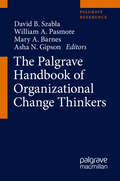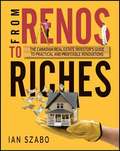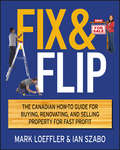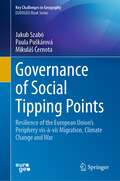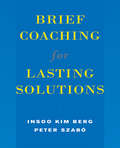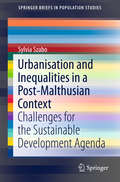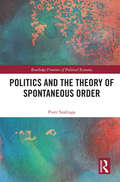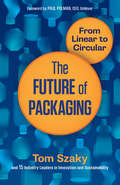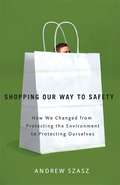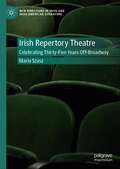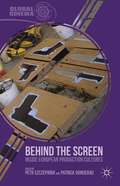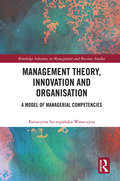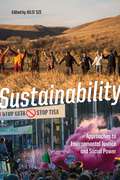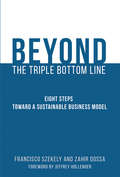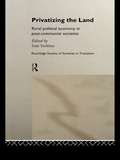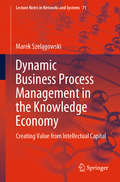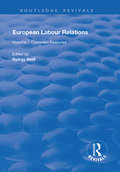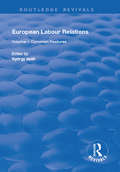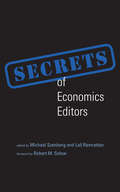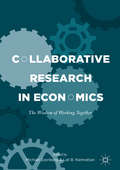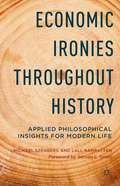- Table View
- List View
The Palgrave Handbook of Organizational Change Thinkers
by David B. Szabla William A. Pasmore Mary A. Barnes Asha N. GipsonThe key developments and advancements in organizational change over the last century are the result of the research, theories, and practices of seminal scholars in the field. While most books simply outline a theorist's model, this handbook provides invaluable insight into the contexts and motivations behind their contributions. Organized alphabetically, this handbook presents inspiring and thought-provoking profiles of prominent organizational change thinkers, capturing the professional background of each and highlighting their key insights, contributions, and legacy within the field of organizational change. By bringing these scholars' experiences to life, we can begin to understand the process of organizational change and analyze what remains to be done for organizations today. This book is the first of its kind--the go-to source for learning about the research and practice of organizational change from those who invented, built, and advanced the field. This comprehensive handbook will help researchers and students to develop their organizational change research agendas, and provide practitioners with concepts, theories, and models that can easily be applied to the workplace to lead change more effectively.
From Renos to Riches
by Ian SzaboFROM RENOS TO RICHESTHE CANADIAN REAL ESTATE INVESTOR'S GUIDE TO PRACTICAL AND PROFITABLE RENOVATIONSAs an investor, part of providing a residence for your tenants is providing a place where they will feel at home and want to stay. How do you do this affordably and strategically? Many landlords will either do a minimal amount of work-and work that has no lasting value-or at the other end of the spectrum, go overboard, using expensive materials and paying for extra and unnecessary labor. Rental renovations are meant as a long-term investment with your best asset in mind-your tenant. Knowing what renovations to undertake and how to do them will guarantee that money is well spent on long-term renovations that last the life of the property and decrease tenant turn-over and loss of rental income.From Renos to Riches is the product of the author's experience as a renovator and investor in residential properties. It offers the reader insights into these key areas: how to assess and cost a renovation and determine if it makes financial sense; what's involved in contracting out a job; how to keep to budget and timelines; how to green your property; jobs you can tackle yourself; design tricks that are inexpensive but look like a million bucks; and much more. With this book you can grow the value of your portfolio of properties; increase cash flow through strategic renovations and decrease expenses by saving money on maintenance by doing the job right the first time; reduce energy usage; and create goodwill with the people who drive your business-your tenants.
Fix and Flip
by Ian Szabo Mark LoefflerThe ultimate how-to guide to fixing-and-flipping propertiesJudging from the number of reality TV shows devoted to home renovation, it's easy to think that fixing-and-flipping is a sure-fire, straightforward way to make money, fast. But there's a lot more to the real estate business than a little hard work and some basic DIY skills. Just like every other business venture, to be successful you need to understand the potential pitfalls as well as the possible profits before diving in, and Fix and Flip: The Canadian How-To Guide for Buying, Renovating and Selling Property for Fast Profit is designed to help you do just that.Putting everything you need to know about how the business of fix-and-flips work right at your fingertips, authors Mark Loeffler and Ian Szabo are the perfect pair for the job, bringing you both the financing and contracting expertise that has made their own renovation business a huge success. Offering step-by-step guidance on exactly how to effectively renovate and sell, Loeffler and Szabo walk you through the skills you need to get started, how to identify properties with potential, saving money on materials, preparing to sell, and much, much more.Packed with expert advice on both the financing and contracting aspects of fixing-and-flipping propertiesFilled with checklists and practical techniques to help you get to work right awayExplains the pitfalls to avoid and the profits to be made in the fix-and-flip businessPacked with invaluable tips, handy checklists, and time- and cost-saving techniques to help you make the most money you can from distressed properties, this is the only book you need to start fixing-and-flipping like a pro.
Governance of Social Tipping Points: Resilience of the European Union’s Periphery vis-à-vis Migration, Climate Change and War (Key Challenges in Geography)
by Jakub Szabó Paula Puškárová Mikuláš ČernotaThis monograph assesses the intersections between social tipping points (STP), a relatively understudied social-ecological concept, and various public policy concepts, such as governance, state capacity and resilience of the state and non-state actors, all within the context of the EU Eastern and Southern periphery. This unique approach is subsequently embodied in the newly created conceptual framework of how the STPs are governed and analyzed using three case studies. The goal is to examine how various state and non-state actors (transnational, private, and local) have managed to navigate the STPs triggered by migration, climate change, and geopolitics. The multi-level governance of STPs is studied within the context of the EU periphery, thus spatial and geographical determinants of the resilience are analyzed as well.
Brief Coaching for Lasting Solutions
by Peter Szabó Insoo Kim BergLike so many helping professionals today, coaches are discovering that the most effective treatment plan is not always the one that takes the most time. Perhaps more so than in any other situation, coaching allows practitioners to quickly forge collaborative relationships with their clients and help them maximize their performance in work and in life. Brief Coaching for Lasting Solutions teaches coaches how to conduct conversations that are most useful to clients in achieving their goals within a brief period of time. The authors, two of the leading practitioners of the brief coaching method, masterfully guide readers through the steps of this process-from the initial meeting to follow-up sessions to troubleshooting setbacks-while illustrating essential skills with ample case examples.This book is written for coaches who want to reduce the time it takes to provide effective coaching while making the best use possible of resources the client brings to the table. At the same time it is written for the benefit of today's clients, so many of whom want to avoid coaching that is time-intensive and costly, and instead seek coaching that is organized, efficient, and affordable.Whether your clients seek a solution to a specific problem or strive toward a more general life goal, this invaluable resource will put you on the path to brief coaching success.
Urbanisation and Inequalities in a Post-Malthusian Context
by Sylvia SzaboThe book examines contemporary urban challenges andopportunities within the context of the traditional Malthusian theory. The bookreorients the classic Malthusian debate on population and food by focusing onglobal urbanisation and its consequences for peoples' access to basic means ofsubsistence. Case studies from bothdeveloping and developed countries provide a comprehensive overview of theissues related to availability of food and water in an urban context. The booksuggests that the concern for human survival is still relevant and can beexacerbated by rapid urbanisation, and that the negative impacts of urbanprocesses require an increased attention of the international community as weenter the new Sustainable Development Goals era.
Politics and the Theory of Spontaneous Order (Routledge Frontiers of Political Economy)
by Piotr SzafrugaThe theory of spontaneous order conceptualises and explains a number of institutional and social phenomena that are not an intended effect of either individual decisions or a collective consensus but an unplanned outcome of interactions between people pursuing their own aims. Drawing on these insights, this book demonstrates the utility of the theory of spontaneous order in explaining many phenomena in political economy and political science. The book opens with a discussion of the history and development of the theory of spontaneous order, particularly in economics and the Austrian School. The epistemological premises of the theory are then explored including the formulation of the central idea of social individualism. Demonstrating the potential applications of the theory of spontaneous order to politics, core ideas are examined including democracy, fragile states and the concept of the veil of ignorance. Finally, the limitations and constraints of the theory of spontaneous order are also reviewed and discussed. This book marks a valuable contribution to the literature on political economy, political science, public choice and political philosophy.
The Future of Packaging: From Linear to Circular
by Tom SzakyOnly 35 percent of the 240 million metric tons of waste generated in the United States alone gets recycled, according to the Environmental Protection Agency. This extraordinary collection shows how manufacturers can move from a one-way take-make-waste economy that is burying the world in waste to a circular, make-use-recycle economy. Steered by Tom Szaky, recycling pioneer, eco-capitalist, and founder and CEO of TerraCycle, each chapter is coauthored by an expert in his or her field. From the distinct perspectives of government leaders, consumer packaged goods companies, waste management firms, and more, the book explores current issues of production and consumption, practical steps for improving packaging and reducing waste today, and big ideas and concepts that can be carried forward.Intended to help every business from a small start-up to a large established consumer product company, this book serves as a source of knowledge and inspiration. The message from these pioneers is not to scale back but to innovate upward. They offer nothing less than a guide to designing ourselves out of waste and into abundance.
Revolution in a Bottle: How Terracycle Is Eliminating the Idea of Waste
by Tom SzakyThe amazing story of what Inc. magazine called "the coolest little startup in America." <P> Tom Szaky dropped out of Princeton a decade ago to found TerraCycle, a company that makes the nonrecyclable recyclable. TerraCycle is now at the forefront of the eco-capitalist movement, partnering with more than 35 million people in twenty countries in the collection of waste and transforming that waste into useful products. Creating trash cans from chip bags and plastic benches from cigarette butts, TerraCycle has redefined recycling.<P> Revolution in a Bottle is a rollicking tale of entrepreneurial adventure and an essential guide to creating a company that's good for people, good for profits, and good for the planet.<P> Since Revolution in a Bottle was first published in 2009, TerraCycle has grown dramatically from a small company offering worm poop in a soda bottle to a pioneer of recycling worldwide. This completely revised and expanded edition continues the story of this incredible company.
Shopping Our Way to Safety: How We Changed from Protecting the Environment to Protecting Ourselves
by Andrew SzaszAndrew Szasz examines this phenomenon and argues that when consumers believe that they are buying a defense from hazards, they feel less urgency to find ways to eliminate them. To achieve real protection, he concludes, we must give up individualized solutions and together seek reform.
The Irish Repertory Theatre: Celebrating Thirty-Five Years Off-Broadway (New Directions in Irish and Irish American Literature)
by Maria SzaszThe Irish Repertory Theatre: Celebrating Thirty-Five Years Off-Broadway is the first book-length history of the multi-award winning Off-Broadway Irish Repertory Theatre Company, from its beginning in 1988 to its thirty-fifth season in 2023. The book considers how the Irish Rep’s plays and musicals reflect the Irish diaspora, the relationship between Ireland and America, and what it means to be Irish and Irish American, both historically, and in the twenty-first century, including how the Irish Rep is showcasing more diverse voices and experiences, from women, the LGBTQIA+ community, and Irish and Irish American people of color.
Behind the Screen
by Petr Szczepanik Patrick VonderauConceptualizing production studies from a European perspective, the book evaluates the history of European thought on production: theories of practice, the languages, grammars, and poetics of film, practical theories of production systems such as film dramaturgy, and the self-theorizing of European auteurs and professionals.
Digital Peripheries: The Online Circulation of Audiovisual Content from the Small Market Perspective (Springer Series in Media Industries)
by Petr Szczepanik Pavel Zahrádka Jakub Macek Paul StepanThis is an open access book. Media industry research and EU policymaking are predominantly tailored to large (and, in the latter case, Western) European markets. This open access book addresses the specific qualities of smaller media markets, highlighting their vulnerability to global digital competition and outlining survival strategies for them. New online distribution models and new trends in the consumption of audiovisual content are limited by, and pose new challenges for, existing audiovisual business models and their legal framework in the EU. The European Commission’s Digital Single Market (DSM) strategy, which was intended e.g. to remove obstacles to the cross-border distribution of audiovisual content, has triggered a heated debate on the transformation of the existing ecosystem for European screen industries. While most current discussions focus on the United States, Western Europe, and the multinational giants, this book approaches these industry trends and policy questions from the perspective of relatively small and peripheral (in terms of their population, language, cross-border cultural flows, and financial and/or symbolic capital) media markets.
Management Theory, Innovation, and Organisation: A Model of Managerial Competencies (Routledge Advances in Management and Business Studies)
by Katarzyna Szczepańska-WoszczynaCompetencies are a component of human capital and one of the most important assets of an enterprise. They play an important role in strengthening the position of the company in a competitive market. Investing in the development of competencies increases the organisation's ability to grow and compete through innovations. This book presents a multi-dimensional analysis of the relationship between managerial competencies and innovations. It analyses the role of a manager in a modern organisation, functions performed by managers, management styles and key challenges, including shaping behaviour in the process of managing change in an organisation, as well as an analysis of the structure of competencies, in particular managerial competencies, and the conditions of the process of forming managerial competencies. Management Theory, Innovation and Organisation: A Model of Managerial Competencies illustrates the organisational conditions of innovativeness, which is the relationship between strategy, structure, organisational culture and leadership and knowledge management and innovation management. The developed model can undoubtedly be considered the author’s pioneering contribution to the studies of managerial competencies and innovativeness. The book will be valuable to researchers, students, and managers in the fields of leadership, organizational studies, innovation management, and human resource management.
Champions of Technological Change: How Organizations Successfully Implement New Technology (Studies on Industrial Productivity: Selected Works #7)
by Theresa M. SzczurekOriginally published in 1994 this book concerns successful implementation of radical, technological innovations within business organizations. It extends and unifies paradigms for understanding implementation of radical innovations by modeling roles and interactions between key vending and buying firm players. It focuses on how interaction between certain players in buying and vending organizations affects successful implementation of the innovation and investigates the relationships between the user, buying change agent and vending change agent.
Sustainability: Approaches to Environmental Justice and Social Power
by Julie SzeA critical resource for approaching sustainability across the disciplines Sustainability and social justice remain elusive even though each is unattainable without the other. Across the industrialized West and the Global South, unsustainable practices and social inequities exacerbate one another. How do social justice and sustainability connect? What does sustainability mean and, most importantly, how can we achieve it with justice? This volume tackles these questions, placing social justice and interdisciplinary approaches at the center of efforts for a more sustainable world. Contributors present empirical case studies that illustrate how sustainability can take place without contributing to social inequality. From indigenous land rights, climate conflict, militarization and urban drought resilience, the book offers examples of ways in which sustainability and social justice strengthen one another. Through an understanding of history, diverse cultural traditions, and complexity in relation to race, class, and gender, this volume demonstrates ways in which sustainability can help to shape better and more robust solutions to the world’s most pressing problems. Blending methods from the humanities, environmental sciences and the humanistic social sciences, this book offers an essential guide for the next generation of global citizens.
Beyond the Triple Bottom Line: Eight Steps toward a Sustainable Business Model (The\mit Press Ser.)
by Francisco Szekely Zahir DossaA pragmatic new business model for sustainability that outlines eight steps that range from exploring a mission to promoting innovation; with case studies.Many recent books make the case for businesses to become more sustainable, but few explain the specifics. In this book, Francisco Szekely and Zahir Dossa offer a pragmatic new business model for sustainability that extends beyond the traditional framework of the triple bottom line, describing eight steps that range from exploring a vision and establishing a strategy to implementing the strategy and promoting innovation.Szekely and Dossa argue that businesses and organizations need to move away from the business case for sustainability toward a sustainable business model. That is, businesses should go beyond the usual short-term focus on minimizing harm while maximizing profits. Instead, businesses on the path to sustainability should, from the start, focus on addressing a societal need and view profitability not as an end but as a means to support the sustainable organization.Szekely and Dossa explore key problems organizations face when pursuing a sustainability agenda. Each chapter presents one of the eight steps, describes a business dilemma for sustainability, provides a theoretically grounded strategic framework, offers case studies that illustrate the dilemma, and summarizes key findings; the case studies draw on the experiences of such companies as Tesla Motors, Patagonia, TOMs, and Panera. The book emphasizes leadership, arguing that leaders who question the status quo, inspire others, and take risks are essential for achieving sustainable business practices.
Privatizing the Land: Rural Political Economy in Post-Communist and Socialist Societies (Routledge Studies of Societies in Transition)
by Iván SzelényiPrivatizing the Land provides an overview of reforms in the state socialist agrarian systems, especially during the 1970s and 1980s in Eastern Europe and the Soviet Union. Using empirical evidence, the contributors provide a balanced assessment of how agrarian economies performed in different communist countries.The Soviet and Eastern European experience is contrasted with reforms in China, Vietnam and Cuba to provide the first comprehensive account of agricultural restructuring after the collapse of communism in Europe and Asia.
Dynamic Business Process Management in the Knowledge Economy: Creating Value from Intellectual Capital (Lecture Notes in Networks and Systems #71)
by Marek SzelągowskiThis book describes modern dynamic business process management (dynamic BPM), which is considerably different from traditional BPM from 20, 10, or even 5 years ago. It demonstrates why traditional BPM is not sufficient in the knowledge economy (KE), while also highlighting the opportunities provided by dynamic BPM – the form of management that practitioners and academics deal with on a daily basis. This involves mastering and implementing e.g. case management, process mining, and RPA, and integrating them with knowledge management. But more importantly, dynamic BPM makes full use of the dynamism of knowledge workers: the people who actually create innovative products and services tailored to the specific needs of clients. The book was primarily written for those managers who see advantageous opportunities amidst the ongoing changes. Accordingly, it focuses more on innovations emerging from practice than on theoretical, academic reflection. In addition to helping organizations operating in the KE to prepare for and implement process management, the book is intended as a source of inspiration for process management researchers and iBPMS system vendors.
European Labour Relations: Volume I - Common Features (Routledge Revivals)
by György SzéllThis title was first published in 2001. With the increasing economic, political and social integration in Europe, there has been a fundamental change in labour and industrial relations. Not only in the Japanese and American challenges in the triad competition under the slogan of ’Lean Management’ but also ecological and democratic challenges are relevant. The directive for the introduction of European works councils is one example of new forms of industrial relations. The question remains since the Hofstede studies on how far will integration go in guarding the cultural specificity’s and identities. The material is structured in a logical and helpful way with a balanced and complete review of the subject. This first of two volumes concentrates on the general features of the European system of labour relations. Both volumes are addressed particularly to academics and students of business administration, economics, sociology, labour law and organizational psychology at university level, and would also be suitable for intensive courses and seminars in the private sector.
European Labour Relations: Volume I - Common Features
by György SzéllThis title was first published in 2001. With the increasing economic, political and social integration in Europe, there has been a fundamental change in labour and industrial relations. Not only in the Japanese and American challenges in the triad competition under the slogan of ’Lean Management’ but also ecological and democratic challenges are relevant. The directive for the introduction of European works councils is one example of new forms of industrial relations. The question remains since the Hofstede studies on how far will integration go in guarding the cultural specificity’s and identities. The material is structured in a logical and helpful way with a balanced and complete review of the subject. This first of two volumes concentrates on the general features of the European system of labour relations. Both volumes are addressed particularly to academics and students of business administration, economics, sociology, labour law and organizational psychology at university level, and would also be suitable for intensive courses and seminars in the private sector.
Secrets of Economics Editors (The\mit Press Ser.)
by Michael Szenberg Lall RamrattanExperienced economics editors discuss navigating the world of scholarly journals, with details on submission, reviews, acceptance, rejection, and editorial policy.Editors of academic journals are often the top scholars in their fields. They are charged with managing the flow of hundreds of manuscripts each year—from submission to review to rejection or acceptance—all while continuing their own scholarly pursuits. Tenure decisions often turn on who has published what in which journals, but editors can accept only a fraction of the papers submitted. In this book, past and present editors of economics journals discuss navigating the world of academic journals. Their contributions offer essential reading for anyone who has ever submitted a paper, served as a referee or associate editor, edited a journal—or read an article and wondered why it was published.The editors describe their experiences at journals that range from the American Economic Review to the Journal of Sports Economics. The issues they examine include late referee reports, slow resubmission of manuscripts, and plagiarism—as well as the difficulties of “herding cats” and the benefits of husband-wife editorial partnerships. They consider the role of the editor, as gatekeeper or developer of content; and they advise authors to write more carefully and clearly, to include citations that locate their articles in the context of the existing literature, and to update their work after it has been submitted and rejected elsewhere. The chapters also offer a timely, insider's perspective on the general effectiveness of the system of academic journals in economics. ContributorsRichard V. Adkisson, Richard G. Anderson, William A. Barnett, Suzanne R. Becker, William R. Becker, Daniel W. Bromley, William G. Dewald, Antony W. Dnes, Zvi Eckstein, Richard Friberg, Esther Gal-Or, Craufurd Goodwin, Thorvaldur Gylfason, Campbell R. Harvey, Geoffrey M. Hodgson, Leo H. Kahane, R. Preston McAfee, John Pencavel, Gerald Pfann, Steven Pressman, Lall B. Ramrattan, J. Barkley Rosser Jr., Paul H. Rubin, William F. Shughart II, Robert M. Solow, Daniel F. Spulber, Michael Szenberg, Timothy Taylor, Abu N.M. Wahid, Michael Watts, Lawrence J. White, Jürgen von Hagen, Fabrizio Zilibotti
Collaborative Research in Economics: The Wisdom of Working Together
by Michael Szenberg Lall B. RamrattanThis collection gathers some of the greatest minds in economics to discuss their experiences of collaborative research and publication. Nobel Prize winners and other eminent scholars from a representative sample of economics' major sub-disciplines share how and why they came to work primarily in partnerships or on their own, whether naturally or by necessity. The contributions include discussions of personal experiences, statistical analyses, different levels of investment, and how the digital age has changed researcher interactions. As budget cuts and resource consolidation make working together vital in ever more fields of academia, this book offers valuable advice to help young and seasoned scholars alike identify the right co-author(s).
Eminent Economists II
by Michael Szenberg Lall B. RamrattanThe sequel to Eminent Economists, this book presents the ideas of some of the most outstanding economists of the past half century. The contributors, representing divergent points of the ideological compass, present their life philosophies and reflect on their conceptions of human nature, society, justice, and the source of creative impulse. These self-portraits reveal details of the economists' personal and professional lives that capture the significance of the total person. The essays represent streams of thought that lead to the vast ocean of economics, where gems of the discipline lie, and the volume will appeal to a wide array of readers, including professional economists, students, and laypersons who seek a window into the heart of this complex field. The contributors include Alan S. Blinder, Clair Brown, John Y. Campbell, Vincent P. Crawford, Paul Davidson, Angus Deaton, Harold Demsetz, Peter Diamond, Avinash Dixit, Barry Eichengreen, Jeffrey Frankel, Richard B. Freeman, Benjamin M. Friedman, John Hull, Michael D. Intriligator, Peter B. Kenen, Anne O. Krueger, Helen F. Ladd, Harry M. Markowitz, Frederic S. Mishkin, Elinor Ostrom, Anwar Shaikh, Jeremy J. Siegel, Vernon L. Smith, Robert M. Stern, Myra H. Strober, Hal R. Varian, Michelle J. White, and Marina V. N. Whitman.
Economic Ironies Throughout History
by Michael Szenberg Lall Ramrattan Vernon L. SmithEconomics for Alfred Marshall, the last of the classical economists, is concerned with activities in the ordinary business of life. In that milieu, we find conflicts and chaotic behavior among people, firms, and countries, which make them conduct their affairs in different, and sometimes, ironic ways. Economic Ironies Throughout History explores, explains, predicts, and harnesses these ironies for economists and scholars alike. Szenberg and Ramrattan distill their core economic ironies from a vast history of philosophy and literature that applies to economic thought. They include philosophical, psychological, literary and linguistic discussions and the personalities behind those ideas such as Socrates, Kierkegaard, Hume, Freud, Jung, Saussure, and Barthes. This book is ideal for economists as well as scholars across the business, social science, and humanities fields.
